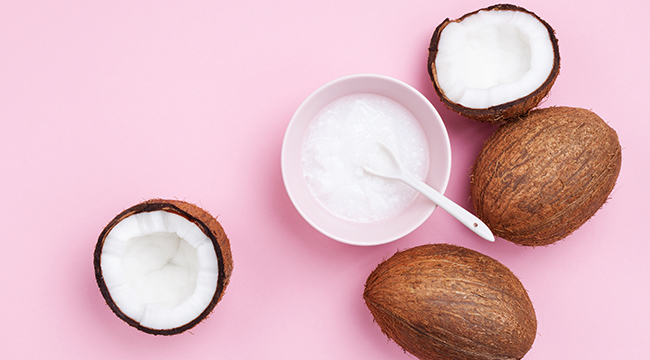
If you’re cool enough to have friends, one of them has bound to sing the praises of coconut oil as a cure-all for everything from dry skin to weight gain. Which is why a recent lecture by Karin Michels, the director of the Institute for Prevention and Tumor Epidemiology at the University in Freiburg, Germany, has the interweb up in arms. Michels, also a Professor at Harvard TH Chan School of Public Health, claims coconut oil is “one of the worst foods you can eat” and has called the stuff “pure poison” according to an article in the Independent. So… maybe think twice before you butter your breakfast sourdough with it?
The issue with coconut oil is the amount of saturated fat contained in the oil. Not unlike lard, at room temperature Coconut oil is solid and that’s due to its high sat-fat content. The American Heart Association advises against high consumption of saturated fats because of their association with cardiovascular disease — still the leading global cause of death at 17.3 million per year.
But don’t throw out that coconut oil just yet, because if you’ve been using the oil for its cosmetic benefits then it can’t be taxing on your heart. Studies show that coconut oil is the second most absorbent oil (behind olive) for lipid penetration within the epidermis. As such, coconut oil works as a great remedy for atopic dermatitis and enhances the barrier of the skin as well as protects you from UV radiation. Because of its anti-inflammatory effects and absorbent nature, coconut oil is a great topical remedy or those who suffer from dry skin.
The AHA found that replacing saturated fat intake with polyunsaturated vegetable oil greatly reduced the risk of developing cardiovascular disease, similar to the numbers achieved by prescribed drug treatment. If you’re looking for a healthy alternative for your heart, we are going to have to recommend the old favorite extra virgin olive oil. But olive oil can be downright gross when used in baking, its low smoke point makes it terrible for frying, and it can add flavor to your food that can be distracting if it wasn’t an intentional choice. So if you’re looking for higher smoke points and more neutral flavors than safflower oil is a good alternative if you’re trying to stay away from chemically processed oils like Canola or vegetable.
We can’t say we are surprised at Michels’s findings — there was always something slightly unsettling about how solidified coconut oil looked. If you do plan on using it in your cooking, make sure you approach coconut oil with strict moderation (as you should other saturated fats) because we know sometimes the bad stuff just tastes so good. We’re looking at you lard in beans!






